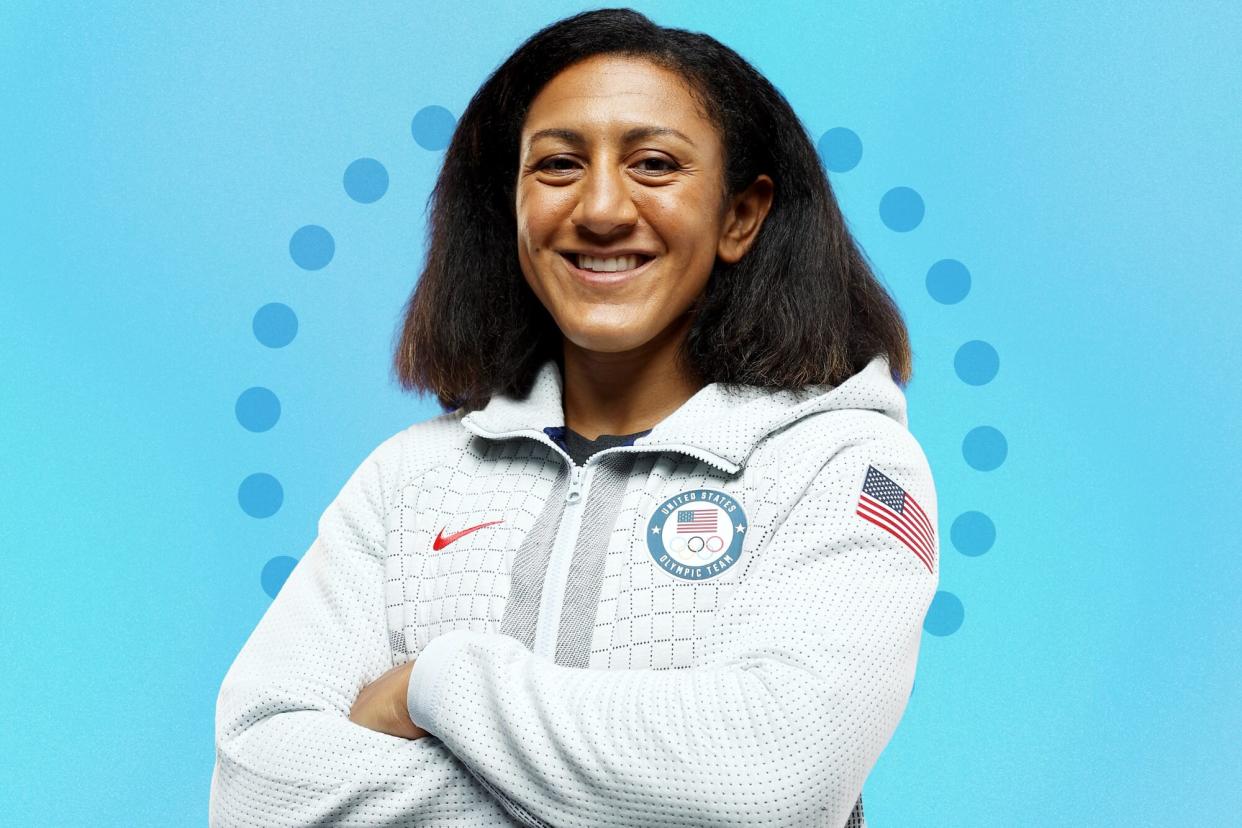Olympic Bobsledder Elana Meyers Taylor Is Proving Female Athletes Aren't 'Tapped Out at 25'

Getty Images
Following a disappointing competition season, Elana Meyers Taylor was hell-bent on leaving the 2022 Winter Olympics with two gold medals she could proudly hang around her two-year-old son's neck.
But COVID had other plans for the acclaimed bobsledder. Two days after landing in Beijing, she tested positive for the virus, Meyers Taylor tells Shape. "That shifted my whole goal," she says. "After that point, it became about just getting to the starting line and having confidence that good things can happen if I just get in the race."
While isolating in a hotel room — and waiting for the negative tests necessary to get back to pre-opening ceremony training — Meyers Taylor missed crucial practice runs on the track, which she says was a major disadvantage. "That was pretty discouraging at that time, to not be able to have that extra ice time, especially because I felt like I needed it," she says. "I felt like I still needed to figure things out throughout the course." (Related: Why Are Olympic Skiers Wearing KT Tape On Their Faces?)
Meyers Taylor wasn't going to go down without a fight, though. She transformed that 32-ish-foot-long room into a home gym and powered through workouts designed by her husband Nic Taylor, a fellow bobsledder and her personal strength and conditioning coach, she says. Without a sled, she practiced her push technique by pressing against a wall with all her might, and she performed bodyweight squats, push-ups, abs exercises, and running drills to keep her body moving, says Meyers Taylor. Eventually, she was able to secure a barbell and an exercise bike, on which she'd sprint as hard as possible for five seconds, rest for 60 seconds, and repeat the process, she explains.
"There were definitely moments sitting in isolation when I had no idea...how this was going to work out, and I definitely had moments of doubt," says Meyers Taylor. "And I'm crazy, insanely grateful for my family, my husband, and everybody for giving me the courage to continue to work through that." (Related: The Harsh Treatment of Mikaela Shiffrin Is Further Proof That There's Way Too Much Pressure on Athletes)
All of the sweat and the support from her loved ones, competitors, and her longtime sponsor, Bridgestone, paid off. Meyers Taylor nabbed the silver medal in the women's monobob event, which made its Olympic debut this year, and a bronze in the two-woman bobsled with partner Sylvia Hoffman. In doing so, she became the most decorated Black athlete in Winter Olympics history, holding five medals. That said, she didn't head into the Games with the expectation that she'd smash records and make history.
"I had no idea, going in, that was a stat," she says. "Now, coming on the other side of it, it's pretty cool. I feel like anytime you go out there, you definitely want to represent your community as best you can — you want to represent your country, your race, everyone, as best you can…I knew I could make good things happen, but I had no idea about any of the other stuff, so it was really crazy to continue to hear about it afterward." (ICYWW, Meyers Taylor did put her medal around her son's neck.)
As a 37-year-old mom, Meyers Taylor is also living proof that women's professional athletic careers don't have to end once they're ready to start a family. "We think women's peak age is around 23 or something like that, but that's only because we haven't given women the permission or the ability to continue their careers any further, because once they start a family, we've told them that it's over," she explains. "I think now you're seeing women like Alex Morgan, Serena Williams, myself, Allyson Felix — all these women continuing their careers later in life after they start a family because there are more doors open, there are more opportunities. And so you'll see the peak age is going to be later and later, the longer women are able to compete. The myth of, 'women are tapped out at 25,' is hopefully just that — it's just a myth."
Still, that myth is one of the reasons why Meyers Taylor put "a little bit of pressure" on herself to get back to training shortly after giving birth via c-section in 2020. "As an athlete, your body is your money-maker — your income is based off of how you're able to perform," she says. "And so I felt the pressure to perform, to continue to provide for this baby that I have now, and also for myself. I just wanted to prove I could do it and I wanted to prove it so bad, that it was possible to come back from this." (Related: Chloe Kim Reveals the Training Routine and Life Lessons That Helped Her Make Olympic History)
Two years and two additional Olympic medals later, Meyers Taylor has clearly shown the world that athletes don't have to choose between their sport and their children — even though her life does feel like "absolute chaos all the time," she jokes. But for the first time after attending the Olympics, Meyers Taylor says she's not totally sure what she'll tackle next. She might help design and build a new style of bobsled or set out for another Olympic run, she says.
"I definitely want to continue to grow the sport, and I want to actually start a sled project and see if I can get a sled built — something to rival the German sled technology," says Meyers Taylor. "So we'll see where that goes and where it takes me, but as far as immediate plans, I'm just going to enjoy being a mom for once."
